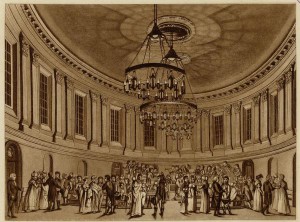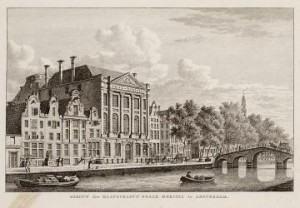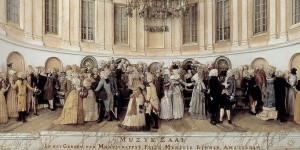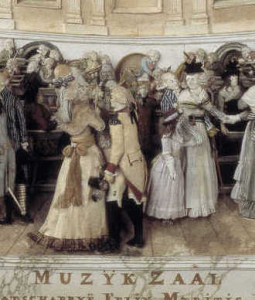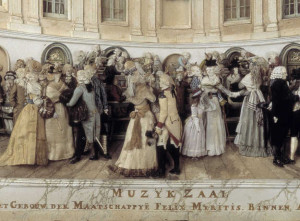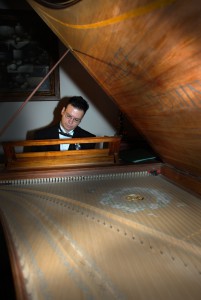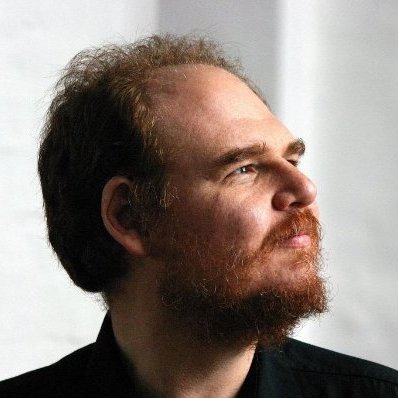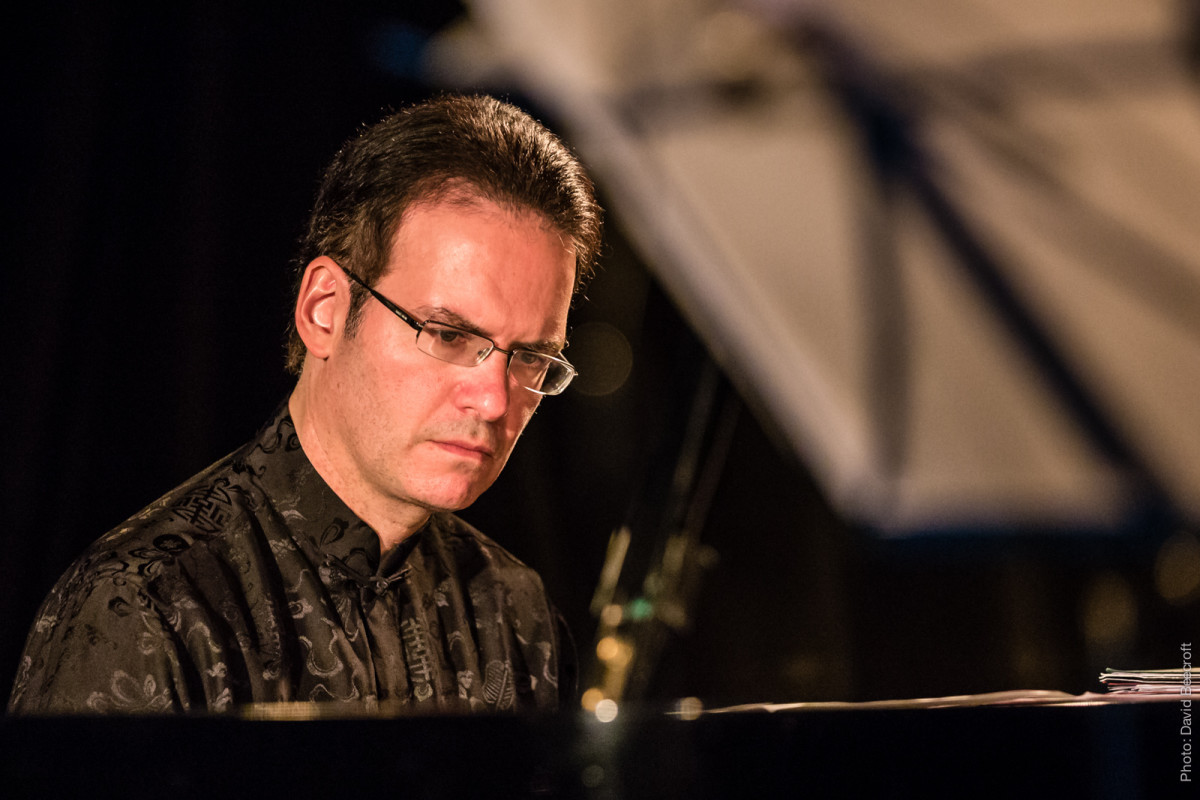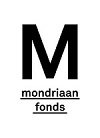Slotconcert Michael Tsalka & Norberto Broggini met Bach in Felix
25 oktober 2015 | 20.15 uur
| Felix Meritis, Amsterdam
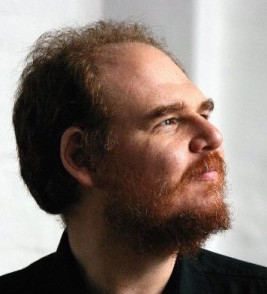
Johann Sebastian Bach (1685-1750): de Zes Trio Sonates, BWV 525 t/m 530
De naam “trio sonates” is verwarrend en verwijst naar het feit dat Bach het schreef voor “twee klavieren en pedalen” (de “pedalen” vormen de derde van het trio). Hij schreef het voor kerkorgel ten behoeve van de Protestantse dienst van de Hof van Köthen, waar hij kapelmeester was van 1717 tot 1723 en waarschijnlijk zijn deze werken hier ontstaan. Bach bracht de werken tussen 1727 en 1732 bijeen in een verzamelband, vermoedelijk als oefenmateriaal voor zijn oudste zoon Wilhelm Friedemann (1710-1784).
Norberto Broggini heeft diepgravend onderzoek gedaan naar de arrangementen voor twee piano’s, die van deze zes werken voor orgel zijn overgeleverd. Waar de organist ook met zijn voeten werkt, wordt dit nu overgenomen door op twee piano’s te spelen: de ene piano speelt de rechterhand en de linkervoet, de andere de linkerhand en de rechtervoet van de organist. De transcripties zijn van de hand van Bachs zoons Carl Philipp Emanuel en Wilhelm Friedemann Bach.
Van deze transcripties zijn, verspreid in muziekarchieven, slechts een handvol versies uit de tijd – deels handmatig overgeschreven – bewaard gebleven. Bovendien is er het door Bach zelf geschreven manuscript “voor twee klavieren en pedalen” voor kerkorgel.
De muziekwetenschapper en expert op het terrein van historische fortepiano’s, dr. Norberto Broggini (Argentinië), heeft het resultaat van zijn onderzoek afgelopen week tijdens ons symposium gepresenteerd. In dit concert geven hij en onze artistiek leider – eveneens muziekwetenschapper – dr. Michael Tsalka, van deze transcripties van dit beroemde orgelwerk van de grote Bach uitvoering op twee historische fortepiano’s en tevens op twee tafelpiano’s.
Het ‘orgeleffect’ van de transcripties komen uitsluitend goed tot hun recht op vroege fortepiano’s, waarbij zonder demper kan worden gespeeld, of bij voorkeur tafelpiano’s, zoals de zogenaamde ‘pantaleon’ uit de nadagen van Johann Sebastian Bach. Het wordt uitgevoerd op de oudste tafelpiano in de Sweelink Collectie, gebouwd in Londen omstreeks 1770 door Johannes Pohlman, en een tafelpiano uit 1798 gebouwd door George Philippe Roduwart in Parijs (bruikleen van Stanley Hoogland). De sonates 3 en 4 worden gespeeld op een fortepiano gebouwd door Michael Weis in Praag omstreeks 1800 en een gebouwd door Johann Zahler in Brünn (Brno) rond 1505 (beide in bruikleen van Gijs Wilderom).
Norberto Broggini:
Norberto Broggini was born in Buenos Aires, where he graduated from the Manuel de Falla Conservatory having specialized in piano and musical culture. He went on to study harpsichord, organ and clavichord at the Geneva Early Music Centre, graduating in 1991. In 1992 he performed as a soloist with the European Union Baroque Orchestra, conducted by Ton Koopman.
As a harpsichordist with the Ensemble Elyma, which is conducted by Gabriel Garrido, he has performed at numerous festivals in Europe, the United States, Africa and Latin America. As an enthusiast for New World organ music, he has played numerous historical Latin American instruments, salvaging and recording forgotten sixteenth- to nineteenth-century repertoires. This effort included the performance of the complete keyboard works by Domenico Zipoli (1688-1726) for Radio Suisse-Romande and the world premier recording of the Chiquitos Organ Book. In addition, he edited unpublished keyboard pieces by Girolamo Frescobaldi taken from a manuscript at the Bodmerian Library in Cologny.
As a resident organist at the Eaux-Vives Church in Geneva, he founded the Ensemble AquaViva in 2002 and gave the dedication concert playing the new Grenzing organ. Norberto Broggini has lectured in numerous musicology symposiums, and taught master classes in Argentina, Belgium, Brazil, Colombia, France, Spain and Switzerland. In 2005, he started an initiative to recover the music of the nineteenth-century Argentine composer Juan Pedro Esnaola (1808-1878) driving the restoration of the composer’s square piano kept at the National Historical Museum in Buenos Aires. In 2008 the Projecto Esnaola was recognized as being “of parliamentary interest” by the Argentine Chamber of Deputies.
Mr. Broggini also has performed the modern world première of several classical and romantic works by Antoine Léonce Kuhn (Alsace, 1753 – Switzerland, 1823) Sigismond Neukomm (Austria, 1778 – France, 1858) Pedro Ximénez Abrill Tirado (Peru, 1780 – Bolivia, 1856) and Claudio Rebagliati (Italy, 1843 – Peru, 1909). His recordings are available on the labels K.617, Ambronay, Cantus, Enchiaridis, NB, Verso and Tradition. His personal collection includes original fortepianos by Longman & Broderip (London, c.1795) Johann Schantz (Wien, c.1802) Dieudonné & Schiedmayer (Stuttgart, c. 1825) Camille Pleyel (Paris, 1841) and Erard (Paris, 1863).
Michael Tsalka
Early keyboard performer and pianist Michael Tsalka (Netherlands/Israel) has won numerous prizes and awards in Europe, the U.S.A., the Middle East and Latin America. A versatile musician, he performs with equal virtuosity a wide span of repertoire from the early Baroque to our days on the modern piano, harpsichord, fortepiano, clavichord, square piano and chamber organ.
Tsalka was born in Tel-Aviv, Israel. After obtaining a Bachelor’s degree from Tel-Aviv University, he continued his studies in Germany and Italy. In 2001, he received a piano solo diploma from the Scuola Superiore Internazionale del Trio di Trieste, where he studied with Dario di Rosa. From 2002-2008, he studied at Temple University under the guidance of Joyce Lindorff, Harvey Wedeen, and Lambert Orkis. Tsalka holds three degrees from that institution: a Master’s degree in chamber music/accompanying, a Master’s degree in harpsichord performance and a Doctorate in piano performance. Other teachers included Sandra Mangsen, Klaus Schilde, Malcolm Bilson, and Charles Rosen.
Dr. Tsalka maintains a busy concert schedule. Recent engagements include performances at the Boston Early Music Festival, the Forbidden City Hall in Beijing, Bellas Artes Theater in Mexico City, the Hermitage Museum in St. Petersburg, the Metropolitan Museum in New York, St. Denis Festival in Paris, Der Gasteig in Munich, Beethoven House in Bonn, the Volksbuehne Concert Hall in Berlin, the Jerusalem Music Center, Sydney Conservatorium of Music, and interviews and live performances for radio stations in Hong Kong, Chicago, Buenos Aires, Berlin, Munich, St. Petersburg, Beijing, Stockholm, Helsinki, Auckland, Amsterdam, Brussels, and Jerusalem. From 2006 to 2015, he has been an artist-in-resident every July at the Anderson Center for Interdisciplinary Studies in Red Wing, Minnesota (www.andersoncenter.org).
Dr. Tsalka has released 15 CDs for labels such as Naxos, Grand Piano, Ljud & Bild (Stockholm), Brilliant Classics (Amsterdam) and Paladino (Vienna). Current and future recording projects include CDs dedicated to keyboard works by J. S. Bach, Daniel Gottlob Türk, Johann Baptist Wanhal, Carl Dittersdorf, Ferdinand Ries, Franz Schubert, Felix Mendelssohn, Viktor Ullmann, Leonardo Coral, Paul Ben Haim, and Yehezkel Braun. Together with Dr. Angelica Minero Escobar, he is preparing a critical edition of Türk’s 30 keyboard sonatas for Artaria Editions in New Zealand (artaria.com). Sonatas 1–12 were published in 2013. Sonatas 13-24 will be published in 2016. Tsalka often collaborates with composers: In 2015-2017, he will perform sixteen world premieres dedicated to him by composers of fourteen different nationalities.
Dr. Tsalka has presented seventy master classes and lecture-recitals in academic institutions and conferences around the world. Six of his scholarly articles have been published by music journals, including De Clavicordio (Italy), Piano Bulletin EPTA (Netherlands), The Early Keyboard Journal and Early Music America (U.S.A.). He taught at the Esther Boyer College of Music, the National Center for the Arts (Mexico), and at Lilla Akademien (Stockholm). Currently, he is a visiting professor at Celaya Conservatory in Guanajuato, Mexico. In 2011, Tsalka was the artistic director of a concert cycle dedicated to J. S. Bach, with presentations at the Forbidden City Concert Hall in Beijing, Qingdao Grand Theatre and Wuhan’s Qintai Concert Hall.
He is the co-artistic director of the Nordic Historical Keyboard Festival in Kuopio, Finland, and the artistic director of the Geelvinck Fortepiano Festival in The Netherlands (www.geelvinckfestival.nl).
In December 2014, he was the artist director of a mini-festival for the Dutch Embassy in Stockholm. www.michaeltsalka.com

